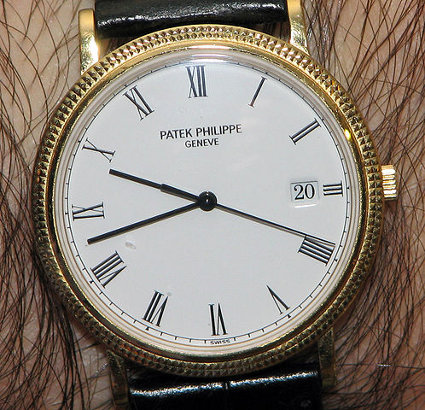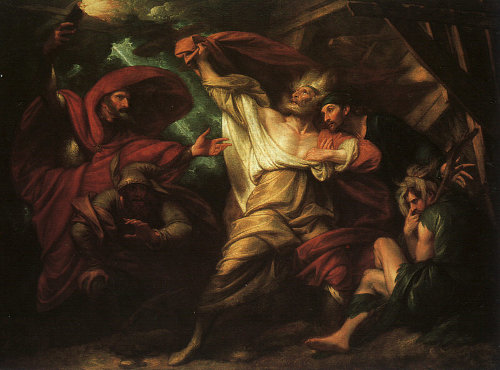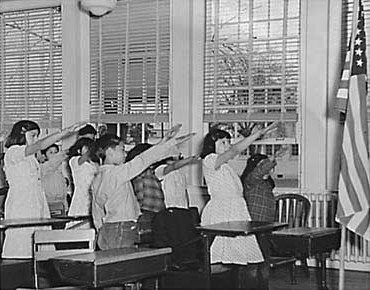
“If villains understood the advantages of being virtuous, they would turn honest out of villainy.” — Ben Franklin

“If villains understood the advantages of being virtuous, they would turn honest out of villainy.” — Ben Franklin
Victor Hugo’s 1829 poem Djinns is a syllabic snowball — its lines grow progressively longer, then shorter, to reflect the passing of a storm of demons:
Murs, ville,
Et port,
Asile
De mort,
Mer grise
Où brise
La brise,
Tout dort.
Dans la plaine
Naît un bruit.
C’est l’haleine
De la nuit.
Elle brame
Comme une âme
Qu’une flamme
Toujours suit!
La voix plus haute
Semble un grelot.
D’un nain qui saute
C’est le galop.
Il fuit, s’élance,
Puis en cadence
Sur un pied danse
Au bout d’un flot.
La rumeur approche.
L’écho la redit.
C’est comme la cloche
D’un couvent maudit;
Comme un bruit de foule,
Qui tonne et qui roule,
Et tantôt s’écroule,
Et tantôt grandit,
Dieu! la voix sépulcrale
Des Djinns! … Quel bruit ils font!
Fuyons sous la spirale
De l’escalier profond.
Déjà s’éteint ma lampe,
Et l’ombre de la rampe,
Qui le long du mur rampe,
Monte jusqu’au plafond.
C’est l’essaim des Djinns qui passe,
Et tourbillonne en sifflant!
Les ifs, que leur vol fracasse,
Craquent comme un pin brûlant.
Leur troupeau, lourd et rapide,
Volant dans l’espace vide,
Semble un nuage livide
Qui porte un éclair au flanc.
Ils sont tout près! – Tenons fermée
Cette salle, où nous les narguons.
Quel bruit dehors! Hideuse armée
De vampires et de dragons!
La poutre du toit descellée
Ploie ainsi qu’une herbe mouillée,
Et la vieille porte rouillée
Tremble, à déraciner ses gonds!
Cris de l’enfer! voix qui hurle et qui pleure!
L’horrible essaim, poussé par l’aquilon,
Sans doute, ô ciel! s’abat sur ma demeure.
Le mur fléchit sous le noir bataillon.
La maison crie et chancelle penchée,
Et l’on dirait que, du sol arrachée,
Ainsi qu’il chasse une feuille séchée,
Le vent la roule avec leur tourbillon!
Prophète! si ta main me sauve
De ces impurs démons des soirs,
J’irai prosterner mon front chauve
Devant tes sacrés encensoirs!
Fais que sur ces portes fidèles
Meure leur souffle d’étincelles,
Et qu’en vain l’ongle de leurs ailes
Grince et crie à ces vitraux noirs!
Ils sont passés! – Leur cohorte
S’envole, et fuit, et leurs pieds
Cessent de battre ma porte
De leurs coups multipliés.
L’air est plein d’un bruit de chaînes,
Et dans les forêts prochaines
Frissonnent tous les grands chênes,
Sous leur vol de feu pliés!
De leurs ailes lointaines
Le battement décroît,
Si confus dans les plaines,
Si faible, que l’on croit
Ouïr la sauterelle
Crier d’une voix grêle,
Ou pétiller la grêle
Sur le plomb d’un vieux toit.
D’étranges syllabes
Nous viennent encor;
Ainsi, des arabes
Quand sonne le cor,
Un chant sur la grève
Par instants s’élève,
Et l’enfant qui rêve
Fait des rêves d’or.
Les Djinns funèbres,
Fils du trépas,
Dans les ténèbres
Pressent leurs pas;
Leur essaim gronde:
Ainsi, profonde,
Murmure une onde
Qu’on ne voit pas.
Ce bruit vague
Qui s’endort,
C’est la vague
Sur le bord;
C’est la plainte,
Presque éteinte,
D’une sainte
Pour un mort.
On doute
La nuit …
J’écoute: –
Tout fuit,
Tout passe
L’espace
Efface
Le bruit.

Japanese puzzle maven Kobon Fujimura devised this mind-reading trick. Ask a friend to look at his analog watch and mentally choose one of the hour numbers. Tell him, “I’m going to point to various numbers on the face of your watch with a pencil. As I do so, count silently, starting with the number after the one you’ve chosen. For example, if you’ve chosen 7, start counting with 8. When we reach 20, say, ‘Stop.'”
Point to any seven numbers at random, pretending to concentrate deeply. Then point to 12, then 11, 10, and so on counterclockwise around the dial. When your friend tells you to stop, you’ll be pointing to the number he had chosen.
The first 10 digits of the golden ratio φ can be rearranged to give the first 10 digits of 1/π:
φ = 1.618033988 …
1/π = .3183098861 …
And the first nine digits of 1/φ can be rearranged to give the first 9 digits of 1/π:
1/φ = .618033988 …
1/π = .318309886 …

In 1983 amateur mathematician George Odom discovered that if points A and B are the midpoints of sides EF and DE of an equilateral triangle, and line AB meets the circumscribing circle at C, then AB/BC = AC/AB = φ. Odom used this fact to construct a pentagon, which H.S.M. Coxeter published in the American Mathematical Monthly with the single word “Behold!”
In May 1869, Lewis Carroll and 13-year-old Isabel Seymour traveled together by train from Oxford to Reading, where they parted, he to go on to Guildford and she to Paddington, London. After they had separated, he realized that he had forgotten to give her her ticket. He wrote to her:
My dear Isabel,
I was so sorry to hear from Miss Lloyd of your not being well, and I hope you will not think of writing to me about ‘Alice’ till you are well enough to do so. I only write this on the chance of your being in the humour to read it, or to have it read to you. When you are in that state, I should like you to know the real reason of my having carried off your railway-ticket. … Well, you told me, you know, that it was your first railway-journey alone: naturally that set me thinking, ‘Now what can I do to give her a really exciting adventure?’
Now three plans occurred to me. The first was to wait till the train had started from Reading, and then fire a pistol through your carriage-window, so that the bullet might go near your head and startle you a little. But there were two objections to this plan — one, that I hadn’t got a loaded pistol with me, the other, that the bullet might have gone in at a wrong window, and some people are so stupid, they might not have taken it as a joke.
The second plan was to give you, just as the train left Reading, what should look like a Banbury-cake, but should afterwards turn out to be a rattlesnake. The only objection to this plan was, that they didn’t keep that kind at Reading. They had only common Banbury-cakes, which wouldn’t have done at all.
The third plan was to keep the ticket, so that you might be alarmed when you got to London. Of course I arranged thoroughly with the Guard that the thing was not to be overdone. He was to look a little stern at first, and then gradually to let his expressive features kindle into a smile of benevolence. I was very particular on this point and almost my last words to him were, ‘Are you sure you can manage the benevolence?’ and I made him practice it several times on the platform before I would let him go.
Now you know my whole plan for making your journey a real Adventure. I only hope it succeeded. So, hoping much to hear you are better again, I remain very truly yours,
C.L. Dodgson

In 1916, after extensive study, French writer Georges Polti announced that all the stories in classical and modern literature could be reduced to 36 essential situations:
For example, the Sherlock Holmes stories are an example of situation 3; Madame Bovary of situation 25; Romeo and Juliet of situation 29; and Crime and Punishment of situation 34. (The full text is here.) Correspondingly, he claimed, in life there are only 36 emotions, whose “unceasing ebb and flow … fills human history like the tides of the sea.”
Though he found that 36 categories were enough “to distribute fitly among them the innumerable dramas awaiting classification,” Polti felt that his system shouldn’t inhibit the creativity of future writers. “Any writer may have here a starting-point for observation and creation, outside the world of paper and print, a starting-point personal to himself.”

When minister Francis Bellamy published the American Pledge of Allegiance in Youth’s Companion in 1892, his colleague James Upham devised a salute to go along with it, snapping the heels together and extending the right arm toward the flag:
At a signal from the Principal the pupils, in ordered ranks, hands to the side, face the Flag. Another signal is given; every pupil gives the flag the military salute — right hand lifted, palm downward, to a line with the forehead and close to it. Standing thus, all repeat together, slowly, ‘I pledge allegiance to my Flag and the Republic for which it stands; one Nation indivisible, with Liberty and Justice for all.’ At the words, ‘to my Flag,’ the right hand is extended gracefully, palm upward, toward the Flag, and remains in this gesture till the end of the affirmation; whereupon all hands immediately drop to the side.
This worked fine until the 1920s, when Italian fascists and then German Nazis adopted similar salutes. Congress delicately changed the American salute to the hand-on-heart gesture in 1942.
In 1953 Robert Rauschenberg obtained a drawing from Willem de Kooning, erased it, and presented the blank paper in a gilded frame titled Erased de Kooning Drawing, Robert Rauschenberg, 1953.
“I wanted to create a work of art by [erasing],” he said. “Using my own work wasn’t satisfactory. … I realized that it had to be something by someone who everybody agreed was great, and the most logical person for that was de Kooning.”
Rauschenberg said de Kooning was annoyed at first by the request, but “would not have wanted to hinder me in my work, if that’s what I wanted to do.” But he chose a particularly dark drawing in charcoal, ink, pencil, and crayon, saying, “We might as well make it harder for you.”

Rats have pretty well overrun the globe, but there’s one exception: Alberta, Canada, which has waged a successful war against the critters for 50 years. Owning rats is forbidden to Alberta residents; they can be kept only by zoos and research institutions. The province maintains a rat control zone 600 kilometers long along its eastern border, staffed by eight professionals, and any rats they find are poisoned, gassed, or shot.
“Alberta is the only province with rat-free status, and we take this very seriously,” Verlyn Olson, minister of agriculture and rural development, said in an August statement. “We have lived without the menace of rats since 1950, when our control program began.”
But it’s a constant battle. In 2003 pest specialist John B. Bourne told National Geographic that he worries the wily creatures will hitch a ride to the interior aboard a truck or train. “They are so adaptive, so intelligent, so successful and physically capable … that it would not surprise me if they show up in a place where you’d least expect a rat to show up. I have the greatest respect for this rodent’s resourcefulness, and [its] capabilities scare the hell out of me.”